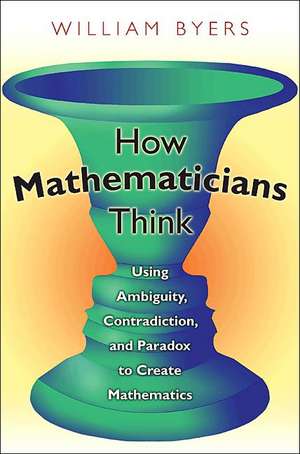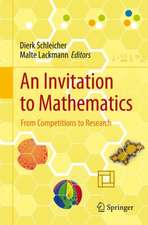How Mathematicians Think – Using Ambiguity, Contradiction, and Paradox to Create Mathematics
Autor William Byersen Limba Engleză Paperback – 6 mai 2010
Nonlogical qualities, William Byers shows, play an essential role in mathematics. Ambiguities, contradictions, and paradoxes can arise when ideas developed in different contexts come into contact. Uncertainties and conflicts do not impede but rather spur the development of mathematics. Creativity often means bringing apparently incompatible perspectives together as complementary aspects of a new, more subtle theory. The secret of mathematics is not to be found only in its logical structure. The creative dimensions of mathematical work have great implications for our notions of mathematical and scientific truth, and How Mathematicians Think provides a novel approach to many fundamental questions. Is mathematics objectively true? Is it discovered or invented? And is there such a thing as a final scientific theory? Ultimately, How Mathematicians Think shows that the nature of mathematical thinking can teach us a great deal about the human condition itself.
Preț: 190.95 lei
Nou
Puncte Express: 286
Preț estimativ în valută:
36.54€ • 38.01$ • 30.17£
36.54€ • 38.01$ • 30.17£
Carte tipărită la comandă
Livrare economică 14-28 aprilie
Preluare comenzi: 021 569.72.76
Specificații
ISBN-13: 9780691145990
ISBN-10: 0691145997
Pagini: 424
Ilustrații: 54 illustrations
Dimensiuni: 156 x 234 x 30 mm
Greutate: 0.61 kg
Editura: Princeton University Press
Locul publicării:Princeton, United States
ISBN-10: 0691145997
Pagini: 424
Ilustrații: 54 illustrations
Dimensiuni: 156 x 234 x 30 mm
Greutate: 0.61 kg
Editura: Princeton University Press
Locul publicării:Princeton, United States
Notă biografică
William Byers is professor of mathematics at Concordia University in Montreal. He has published widely in mathematics journals.
Descriere
To many outsiders, mathematicians appear to think like computers, grimly grinding away with a strict formal logic and moving methodically - even algorithmically - from one black-and-white deduction to another. This book reveals that mathematics is a profoundly creative activity and not just a body of formalized rules and results.



